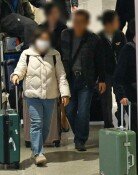[Opinion] The `Other Victims` of Terror
[Opinion] The `Other Victims` of Terror
Posted September. 22, 2001 08:53,
![[Opinion] The `Other Victims` of Terror](https://dimg.donga.com/egc/CDB/ENGLISH/Article/20/01/09/22/2001092229878.jpg)
A week after the 110th floor building of the World Trade Center, the symbol of American capitalism, fell like a scene from a movie, one TV station aired a news program titled, `The Other Victims`. The program reported the traffic congestions and delays caused by the tightened security and inspection at the U.S. military base in Yongsan, Seoul. One bus driver and passengers asked why they should suffer when the terrorist attack took place in America and complained that they feel like the whole nation is being treated like a terrorist.
Whatever one thinks of the terrorist attack is up to each person. It does not matter how many Americans were sacrificed during the Korean war, how much food they gave us when it was so hard for us, and how they helped Korea recover after the war. We do not need to consider how many Korean immigrants America accepted and how many of our products they bought to help our economy prosper.
Can we at least be patient with a minor thorn in the side when our neighbors lost over 5000 family members? It is not clear whether it is coincidence or not, but the TV station that aired the program is reported to be fighting against the dropping ratings.
On the topic of victims, are these the only `other victims` of the terrorist attack? It is difficult to mention, but if we do not carefully monitor the economic policies that the government will try to implement, using the terrorist attacks as a pretext, the people who will really suffer will be our next generation.
The recent foreign payment report published by the Korea Development Institute, which addresses the issue of national debt and the possibility that it will cause financial insolvency, provides support for this. According to this report, a conservative estimate projects that our national debt will reach at least 400 trillion won and at most 693 trillion won.
The things that happen when a country`s debt rises are obvious. For example, the national debt in the year 2003, by which the government promises to implement its financial adjustments, will rise above 190 trillion won and the interest will be 10 trillion won – if the current low interest rate continues. Of course, this interest rate only applies if the debt does not increase more. The national budget is around 100 trillion won. How will the nation survive if it has to pay 10 trillion in interest alone? If finances become worse and economic investment decreases, the administration will collect an insufficient amount in taxes that will lead to borrowing more money. When Korea Bank printed currency notes and caused inflation, the people`s lives became meager and interest rates skyrocketed, creating a very bad situation.
History has shown without exception that when the dam of healthy finances falls, it is hard for any industrialized nation to build it up again. Although the US finally balanced its budget after 30 years, it was only able to do so after eight consecutive years of prosperity. Japan`s past economic and financial boom and its present crisis are part of the same dynamic.
In this situation, our administration is talking about `investigating artificial means of economic support even if it means further financial difficulty` in the name of the terrorist attack. Only two months ago, Vice Prime Minister and Minister of Finance and Economy Chin Nyum said ``Maintaining the economy through financial disbursement demands high risk and therefore will not be considered.`` One wonders what has happened so that even the head of the national economy was forced to change his mind?
All the governmental policies that sound good such as guaranteeing citizens` basic livelihood, raising Autumn purchase capacity, motherhood protection law, five-day work week are all predicated on the premise that the next generation will bear a huge debt burden. There are no freebies in the economic world, which means that a people seduced by a carrot on a stick will eventually end up eating plant roots. Yet, we cannot rely on the National Assembly members who only know how to spend money and have no clue about how frightening a financial collapse can be. The young officials who took managed the finances in the past at least had the willpower to insist that balanced budget had to be maintained for unification expenses and resisted the pressure to increase government spending. Even that will is hard to find now.
The terrorist attacks took place at a time when the administration faces the upcoming presidential elections and intends to increase spending to curry the people`s favor. As a result, the next administration will inherit a worse economic situation than the financial crisis that the present administration confronted in its inception. One fears that our next generation will become the `other victim`.
Lee Kyu-Min (Editorial Staff Member)
Lee Kyu-Min kyumlee@donga.com







